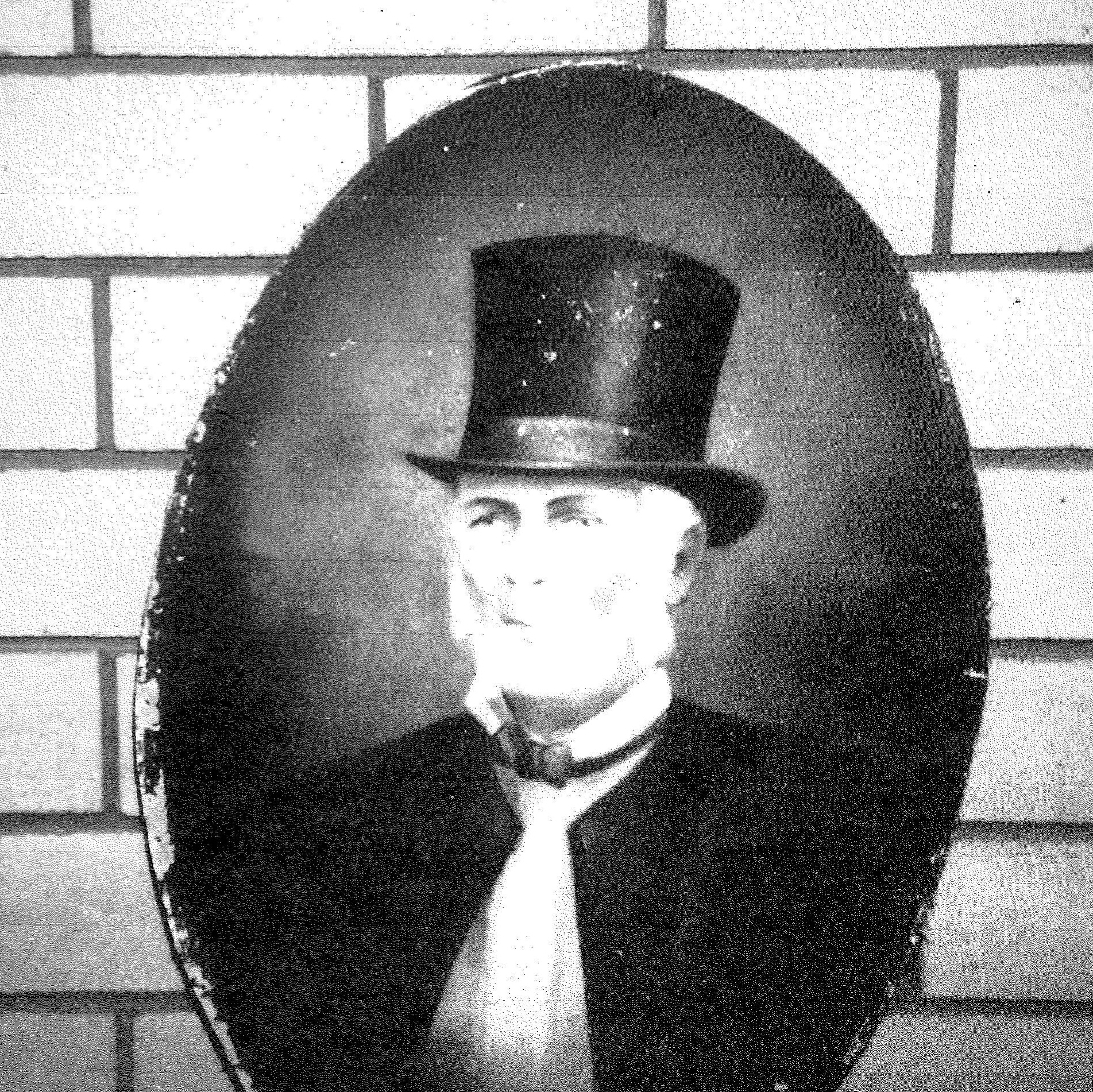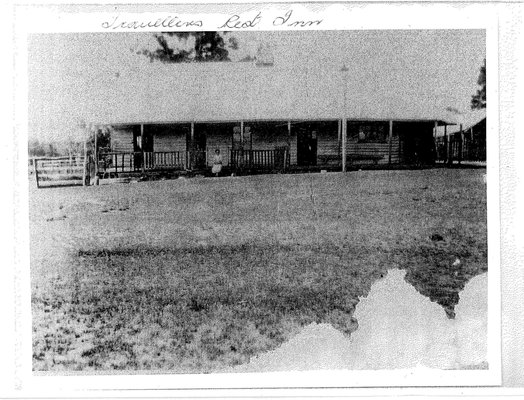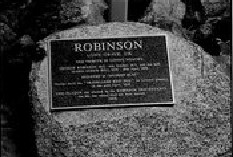George Robinson (1815 – 1872), born in Edinburgh, Scotland, arrived in Queensland ca. 1850. He was licensee of the Traveller’s Rest Inn at Musket Flat from 1858 to 1872. He was also co-owner with Thomas Duncan of the Musket Flat Bullock Team and Doongal Station. Robinson married Maria Hill in Gayndah in April 1855. He died at Musket Flat on 6 October 1872 and was buried on the property, Lone Grave No 238.
George Robinson was born in Edinburgh, Scotland in 1815. According to George he changed his birth name of Robertson to that of Robinson. His father’s name on his death certificate shows Robertson. Family research indicates that Robinson was transported to Van Diemen’s Land for 14 years for breaking down a door and stealing a leg of ham, but this has not yet been confirmed.
The first record of Robinson’s presence in Queensland is his marriage to Maria Sarah Hill in April 1855 at her parent’s property in Gayndah. Maria was born in Hobart Town, Tasmania in 1839.
Robinson ran the Traveller’s Rest Inn at Musket Flat, a small town west of Maryborough previously known as Eliott, from 1858 until the time of his death in 1872. An article in the Maryborough Chronicle, Wide Bay and Burnett Advertiser in August 1862 described the development of Musket Flat township as such:
We learn that this embryo township is progressing satisfactorily, there being three buildings now in course of erection in the locality. The first is a new store, the property of Messrs. Robinson and Duncan; secondly Mr. Grout’s blacksmithing establishment; and thirdly a private residence. The store and smithy will be of great advantage to travelling public, particularly to bullock-drivers. The township having been already surveyed several persons are anxiously expecting to see some of the lots offered for sale.
The township grew due to large consignments of wool, tallow and hides which were transported mainly by bullock drays from various stations to Maryborough. In turn, supplies such as produce, ammunition, kerosene, nails, tools, rope and a variety of daily use items were carried to the larger stations sprawled throughout the region.
The name Musket Flat may have derived from the earlier days when the Native Police troopers were camped in the area near the lagoon. The local Aborigines were said to have crept into the camp and removed all the muskets, dumping them into the lagoon.
Robinson purchased seven land allotments, the cost of which ranged from £4 to £13 per allotment. The Traveller’s Rest Inn was built on just over 3 acres of land for which Robinson paid £38 15s. The Inn became the official stopping point for the Maryborough to Gayndah coach service after Malcolm McGregor and George Ambrose White drove the first coach through the town 1861. In April of 1868 a complaint against the renewal of Robinson’s licence due to the uncleanliness of the Inn was dismissed by the licencing board.
The bushranger known as the “Wild Scotsman” was apprehended in March 1866 near the town of Gin Gin in the Wide Bay region. Descendants of Robinson report that James Alpin McPherson (the Wild Scotsman) had a brief stopover at George Robinson’s Traveller’s Rest Inn. When George saw McPherson chained to a tree outside the Inn with the horses, he insisted that the bushranger should partake of his hospitality and had a trooper take him a beer.
The well-known Musket Flat Bullock Team was owned by George Robinson and Thomas Duncan. The team worked the Maryborough to Gayndah line with considerable distinction, for his reputation of prompt service was wide-spread. George also held a timber licence and probably transported felled timber via his bullock team. In February 1863 the bullock team was advertised for sale. The asking price was £320 for 20 bullocks, 2 drays, tarpaulins, tackling etc. and the advertisement read: ‘The teams are so well known on the road that further comment is unnecessary’.
In September 1862 Doongal Station, owned by Messrs R. and B. Binney, was sold to Robinson and Duncan. In April of 1867 Doongal Station, described as a ‘first-class cattle station’, was advertised for sale along with 300 head of cattle.
Robinson owned a racehorse called “Faugh-A-Ballagh”, a Gaelic name thought to mean “Son of Faugh”. The horse regularly raced at Gayndah, however in a newspaper article published in November 1865 the organisers of the Gayndah Christmas races asked:
What has become of our old friend Mr. George Robinson, of Musket Flat? You Maryborough people must attract his attention entirely. I like to see old supporters of Gayndah races in the field, and I hope to see George here at Christmas with at least two “flyers”.
Alexander Ballantyne, charged with the attempted murder of an Aborigine named Toby, was committed for trial in November 1863. At the committal hearing George Robinson and Thomas Duncan appeared as witnesses and gave evidence in support of Toby who was in their employ. Robinson appeared in court once again on 31 March 1864 when Joseph Stockwell was charged with larceny from Duncan and Robinson. It was claimed he had stolen a cash-box and a gold watch but the case was dismissed due to lack of evidence.
Throughout the 1860s Robinson generously gave subscriptions to aid the erection of a National School in Maryborough. A newspaper article published in November 1869 reported that George Robinson donated the land and gave money for the building of a school at Eliott, also known as Musket Flat.
A house at 14 North Street Maryborough was also owned by Robinson. He purchased the land on 6 November 1857 and Stirling House stands on that land today. After his death the house was kept in trust for the children. The trustees were long-time friends of Robinson, James Stephen Powell and William Powell. The Powell brothers transferred the licence for the Traveller’s Inn to Robert Wade in 1872.
George Robinson was one of the first settlers and contributed immensely to the development of the region incorporating Musket Flat, Gayndah and Maryborough. The family believe that the range known as Robinson’s Range, situated near Fairlies Knob National Park was named after George. It was surveyed in 1861 and advertised as Robinson’s Range in July 1863.
Maria died on 18 April 1868 and George 6 October 1872. They are both buried on the property where the Traveller’s Rest Inn was located and is now owned by the Wade family, descendants of Robert Wade.
Citation
Lee Butterworth and June Robinson, ‘George Robinson (1815 – 1872)’, Harry Gentle Resource Centre, Griffith University, 2018, https://harrygentle.griffith.edu.au/life-stories/george-robinson/.
Archival Resources
Record ID 1872/C/724
Newspapers
Supreme Court Brisbane, The North Australian, Ipswich and General Advertiser, 5 Oct 1858, p. 3.
Supreme Court, Moreton Bay Courier, 29 Sep 1858, p. 2.
Classified Advertising, Moreton Bay Courier, 1 Jan 1859, p. 4.
Advertising, Maryborough Chronicle, Wide Bay and Burnett Advertiser , 2 May 1861, p. 1.
No title, Maryborough Chronicle, Wide Bay and Burnett Advertiser , 19 Dec 1861, p. 2.
Police Court, Maryborough Chronicle, Wide Bay and Burnett Advertiser , 17 Apr 1862, p. 2.
No title, Maryborough Chronicle, Wide Bay and Burnett Advertiser , 28 Aug 1862, p. 2.
No title, Maryborough Chronicle, Wide Bay and Burnett Advertiser , 25 Sep 1862, p. 2.
Advertising, Maryborough Chronicle, Wide Bay and Burnett Advertiser , 25 Sep 1862, p. 3.
Police Court, Maryborough Chronicle, Wide Bay and Burnett Advertiser , 17 Apr 1862, p. 2.
Police Court, Maryborough Chronicle, Wide Bay and Burnett Advertiser , 26 Nov 1863, p. 2.
Advertising, Maryborough Chronicle, Wide Bay and Burnett Advertiser , 19 Feb 1863, p. 3.
Annual Licensing Meeting, Maryborough Chronicle, Wide Bay and Burnett Advertiser, 23 Apr 1863, p. 2.
Gayndah, Maryborough Chronicle, Wide Bay and Burnett Advertiser, 16 Jul 1863, p. 2.





